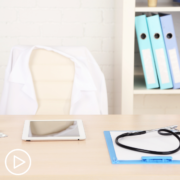Prostate Cancer Clinical Trial Safety and Protocols
Prostate Cancer Clinical Trial Safety and Protocols from Patient Empowerment Network on Vimeo.
Expert Dr. Sumit Subudhi explains clinical trial safety protocols, the risks of participation, and addresses the patient concern of clinical trials as a last-resort treatment option.
Dr. Sumit Subudhi is an Associate Professor in the Department of Genitourinary Medical Oncology, Division of Cancer Medicine at The University of Texas MD Anderson Cancer Center. Learn more about Dr. Subudhi.
See More From Prostate Clinical Trials 201
Related Resources

Understanding Prostate Cancer Clinical Trial Phases and Types |

What Should Prostate Cancer Patients Know About Clinical Trials? |

Tools for Choosing the Right Prostate Cancer Treatment Approach |
Transcript:
Katherine:
Patients also often have questions about safety. So, what are the risks of clinical trial participation?
Dr. Subudhi:
So, safety is a major issue, especially more into the Phase I. The Phase I trial, if you remember, are the trials where we’re dose escalating, meaning we start off with a small cohort of patients, maybe three to five patients. And we give one dose of the drug. We see if it’s safe. If it’s safe, then we go to the next dosing level. And we just keep going until we find a dose that may be too toxic or too unsafe for our patient.
So, in the Phase I, we have less information, especially in the first-in-human drugs. But in those cases, we are watching you carefully to make sure that nothing bad happens to you.
But the problem with those trials is it requires a lot of time at the institution or with your doctor. For example, I’m doing a bispecific trial where we have to keep the patients inside the hospital for eight days, purely for safety reasons. They’re not getting the drug for all eight days. But we’re just keeping them under observation so in case anything bad happens we’re ready to react because we know that if something bad happens at their home in that first eight days, it could actually risk their lives.
So, in those cases, some trials, if we’re concerned about safety, you’ll be spending more time in the doctor’s office or in a hospital being evaluated. So, that’s the one negative. But sometimes, the trials that can be more exhausting as far as the amount of time it takes you away from your home and family are the ones that have the most reward.
Katherine:
Well, then it’s a tossup, isn’t it?
Dr. Subudhi:
That’s right.
Katherine:
You have to decide what’s more important.
Dr. Subudhi:
That’s correct.
Katherine:
Well, what protocols are in place to protect patients?
Dr. Subudhi:
So, when they sign up for a protocol, we are instructed to give them our best information. So, let’s say it’s a first-in-human drug. Well, usually, first-in-human drugs are tested in other mammals, such as monkeys, and we look for toxicities there. And we have signs of what’s going to happen. Sometimes, a first-in-human drug is part of a class of drugs, like I talked to you about T-cell bispecifics.
Well, there’s several T-cell bispecifics out there. And we’ve learned that this class of drugs has a unique set of side effects that they all tend to have. Some have it more, and some have it less.
But when we’re discussing this with you or the patient, we are actually going to go through each and all of these side effects. Now, me personally, my patients that go on my trials, they all get my cellphone number so they have 24/7 access to me because I know they’re taking a risk. And it’s a lot of courage to go on these trials. And it’s scary. And I want to make sure they don’t feel like they’re ever alone.
Katherine:
Another common concern we hear is that a clinical trial is only considered when there are no other treatment options available for a patient. What are your thoughts on this?
Dr. Subudhi:
There’s a lot of my colleagues in the field that feel that way. And I know a lot of patients’ misconceptions are also that way. And that’s partly because of Hollywood and movies and TV shows that we watch. But I think that many people, especially in the medical field, think of clinical trials as the last resort.
And I actually disagree with that. I think that I like to actually start my patients with one or two standard of care treatments. But after that, really start putting clinical trials in between. And we have to remember that there’s not always a clinical trial available that the patient actually meets the criteria for.
So, it’s always disheartening in clinic when I meet someone for the very first time who was referred to me because they exhausted everything. And we just don’t have any clinical trials available, or they’re so weak from the cancer and all the prior treatments that they don’t qualify for a clinical trial. And then I really don’t have anything else to give them.
So, my personal approach is to try to put clinical trials in between and always have something in my back pocket so that if they get a bit exhausted or they want to spend more time with friends and family, they can get the standard of care treatment.












